Poultry palette
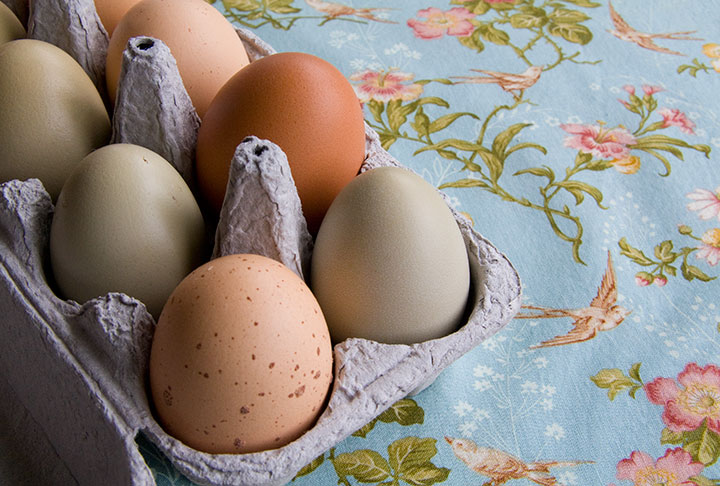
We buy our eggs from a friend’s urban farmstead—every time we get a new delivery, I get more excited about the colors in the carton than the prospect of fresh omelettes. Is that weird?

We buy our eggs from a friend’s urban farmstead—every time we get a new delivery, I get more excited about the colors in the carton than the prospect of fresh omelettes. Is that weird?
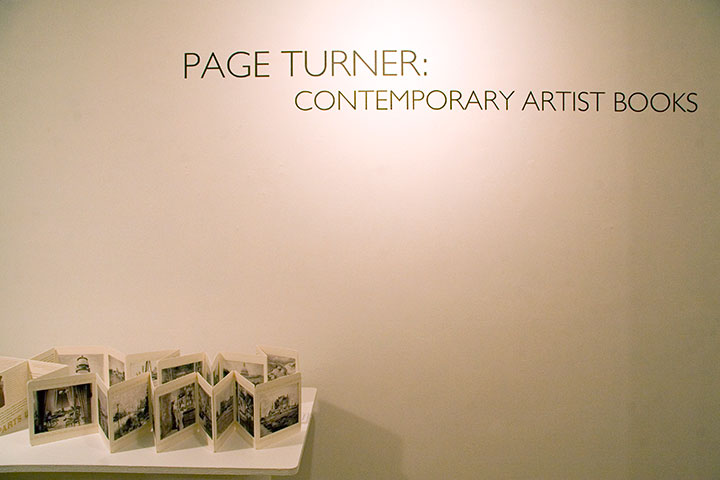
If you ever wanted to find out once and for all what the heck an artist book is, take a little field trip to Burien, WA. The group show Page Turner: Contemporary Artist Books is up this month at the Burien Arts Gallery, a tiny half-Cape house converted into a charming exhibition space.
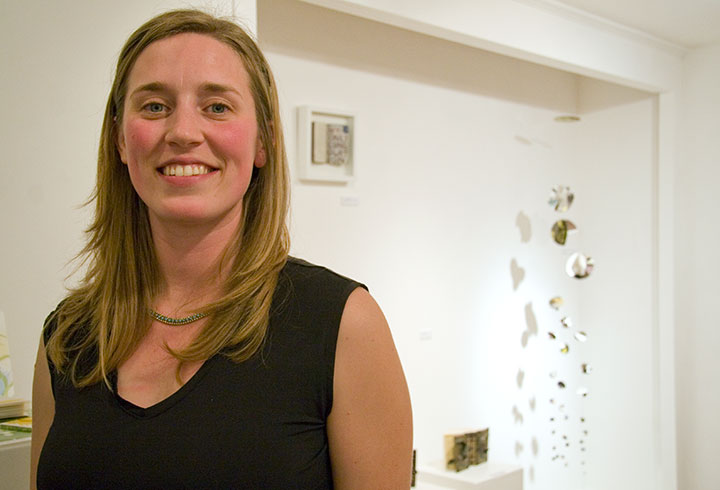
Kelda Martensen did a stand-up job of curating the show—and artist books aren’t easy to display, believe me. She’s represented a wide variety of work, from prints to traditional bindings to kinetic sculptures, featuring the work of artists nationwide, including Inge Bruggeman, Ken Botnick, Regin Ingloria, Jana Harper, Diana Guerrero-Macía, and many others.
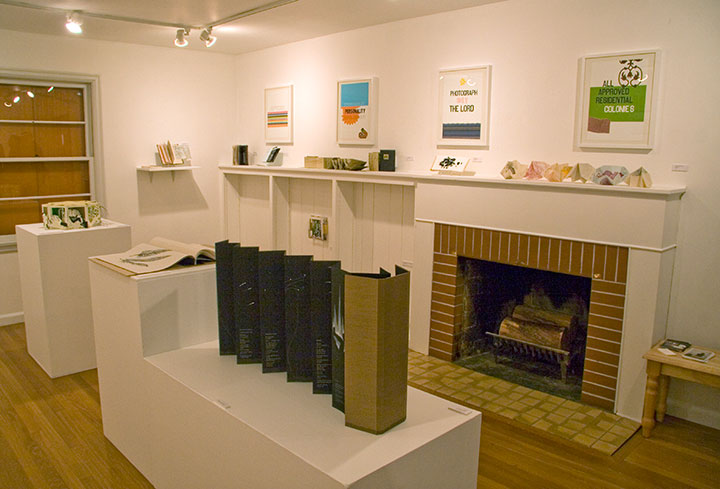
The gallery is open noon to four, Thursday through Sunday, and on Thursday, March 18, at 7 pm, Kelda will be giving a curator’s talk about the work in the show, sponsored by the Book Arts Guild. Free admission, always.
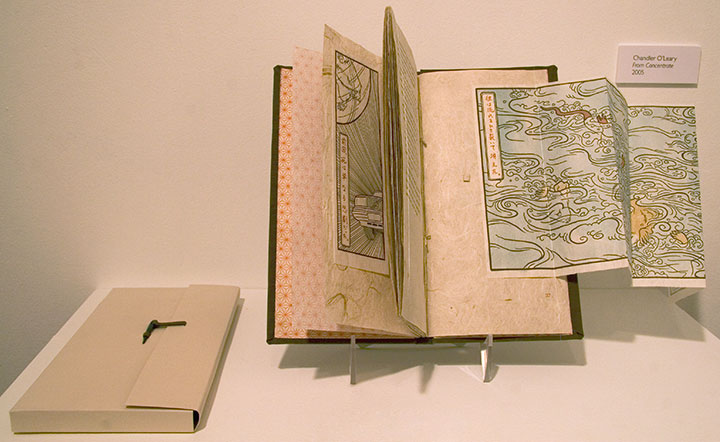
I’ve got a couple of pieces in the show, as well. Above is From Concentrate,
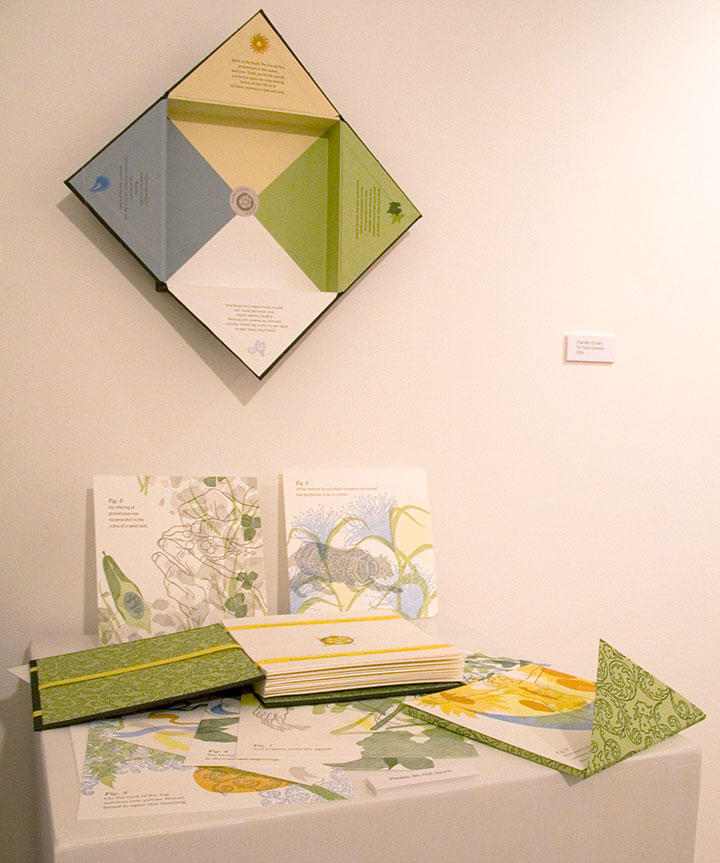
and this is The Faery Gardener.
Here’s the rub, though: the recession has hit all galleries where it hurts, but since the Burien Arts Gallery is run by the city, times have been especially tough there. This will be the last exhibit in the Cape Cod house; and possibly the last ever for Burien Arts, unless they can find public support, funding and a new space. So come check it out before they have to close their doors on March 19 (the website says they’re already closed, but you can still see the show).
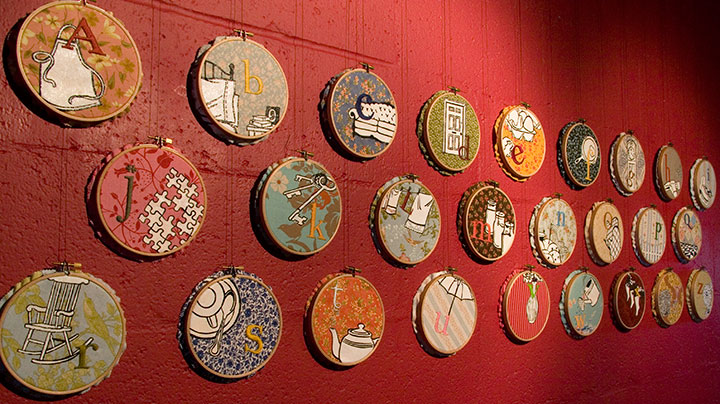
Speaking of artist books, if you missed Mnemonic Sampler at PLU, there’s another chance to catch the series in a new venue, closer to home: the Tempest Lounge, here in Tacoma.
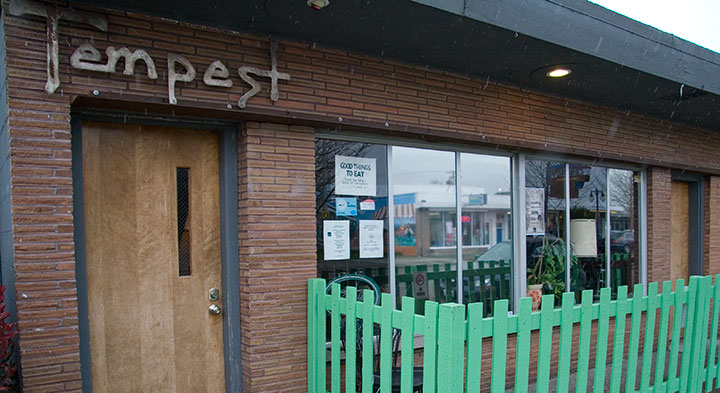
My friend Denise is the owner of the place, and when she asked if I was interested in showing there, I jumped at the chance. Although I love the clean beauty of a traditional gallery space, my favorite exhibition venues are the offbeat ones—restaurants, coffee shops, libraries, and now classy retro bars! I love these spaces because they bring art into real life, and invite folks to feast their eyes wherever they are. Most people (including myself, I must admit) are more likely to step into an eatery or a library than a gallery, and a coffee shop doesn’t have the same intimidating associations that some people have with galleries (that feeling of “If you’re not here to buy, you shouldn’t be here at all”). Plus, at the Tempest you can have a beer or cocktail while you look at the art. You can’t beat that.
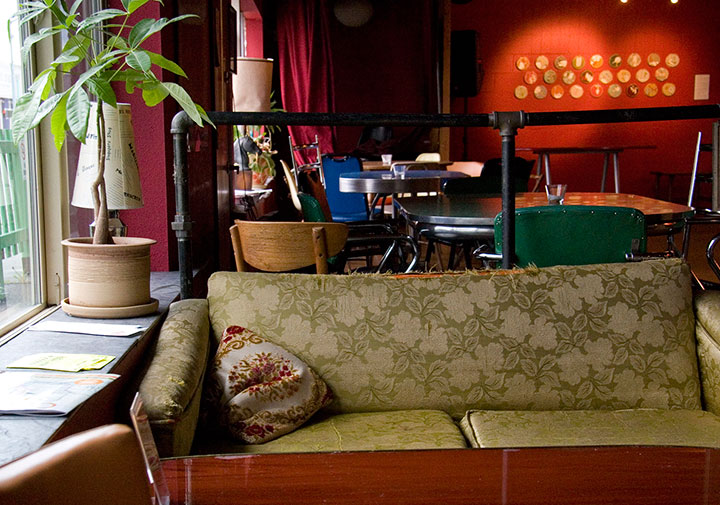
If beer isn’t your thing, you can also have a cuppa tea or joe, and the food is divine—Denise runs a classy joint here. So curl up on a retro couch for happy hour, come chat by the adorable green picket fence, or just stop in to take in that fabulous red wall. Mnemonic Sampler will be up through April 30.
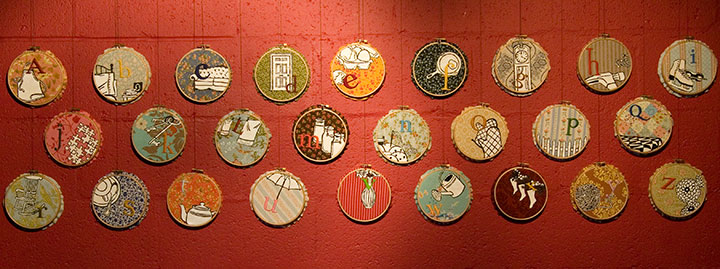
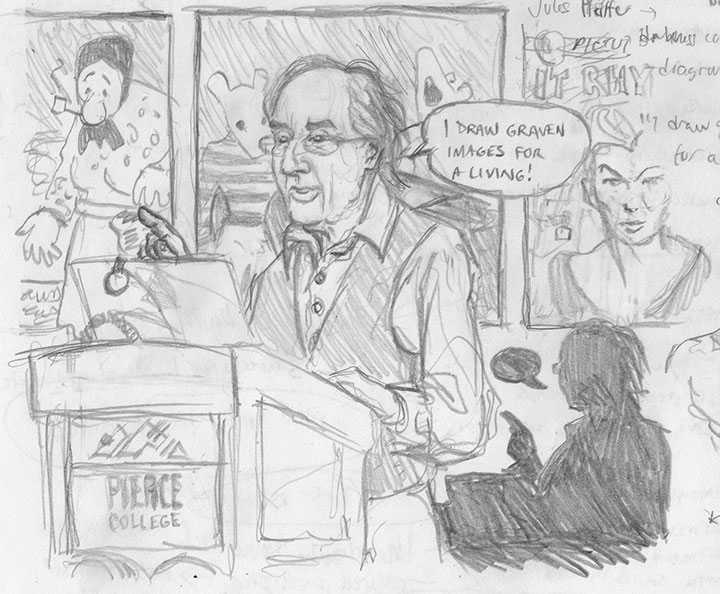
The other night I went to a talk by comics artist Art Spiegelman, and as usual, brought one of my trusty sketchbooks with me. Since comics and I go way back, and I’m a big Spiegelman fan, I think I got a little carried away with the doodles accompanying my lecture notes. I was a little abashed when the people next to me noticed and commented; all I could say was, “I do this a lot—it helps me remember.”
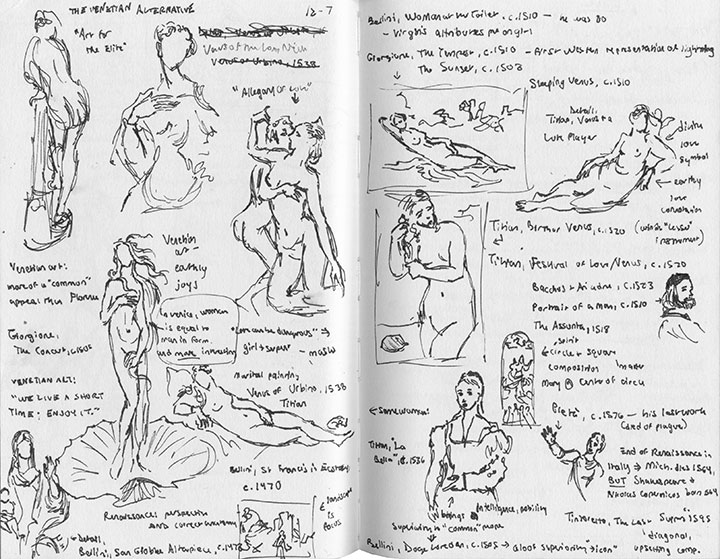
I’ve always been an obsessive note-taker, but I discovered in college that adding sketches to my notes went a long way towards my good grades in art history (this must have been the “Naked Ladies of the 15th and 16th Centuries” lecture or something).
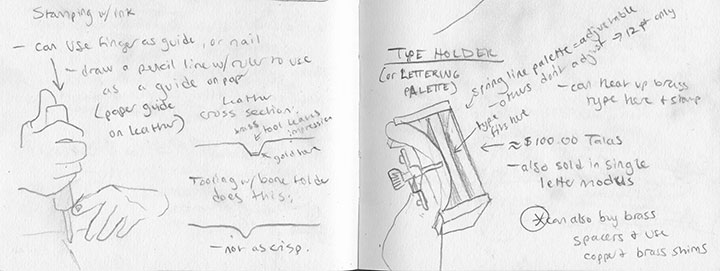
Then when I fell in with the book arts, drawn diagrams were a godsend for remembering complicated equipment and technical processes.
By the time I graduated, the habit was ingrained. I found not only that drawing was an excellent memory trigger, but also helped me focus on the moment at hand.
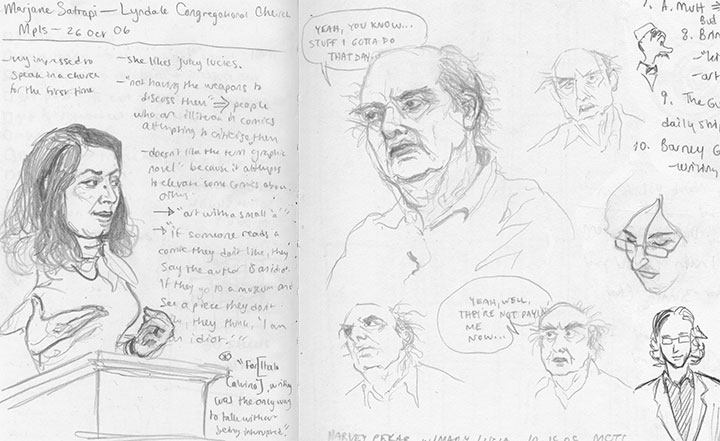
The comments on my Spiegelman doodle reminded me that I had a funny habit of drawing comic artists and writers (from the left, Marjane Satrapi, Harvey Pekar, David Mazzucchelli)—and often portraying them as comic-book characters themselves. As I dug through something on the order of fifteen sketchbooks to find my grumpy Pekar sketches, I unearthed scores of these things, from all manner of locations and events:
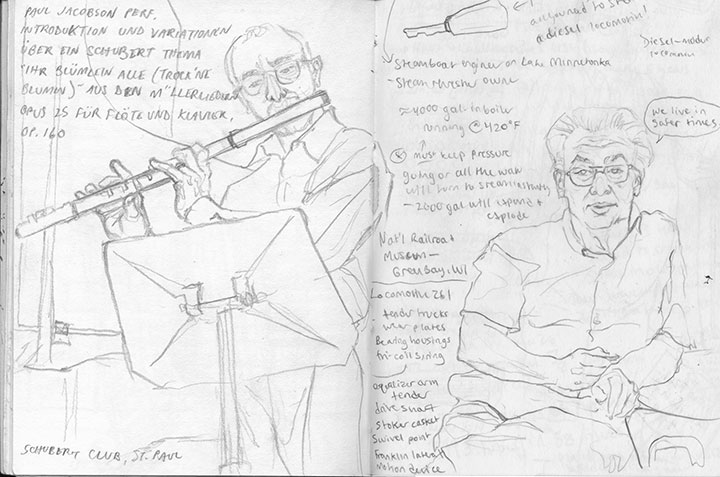
classes, performances and lectures;
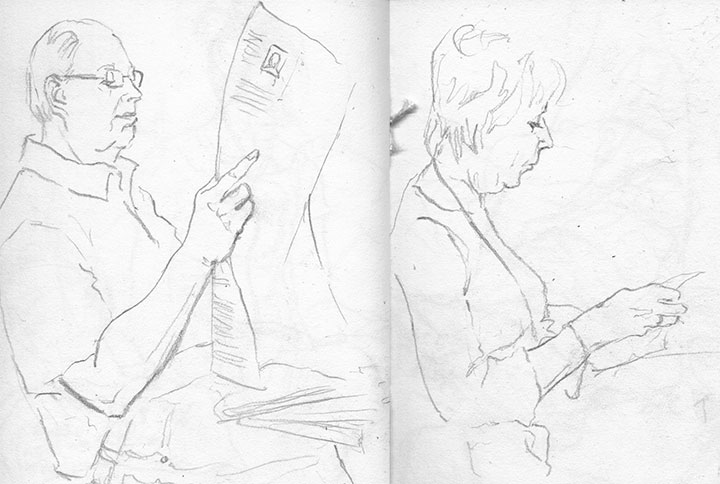
public transit and airports—
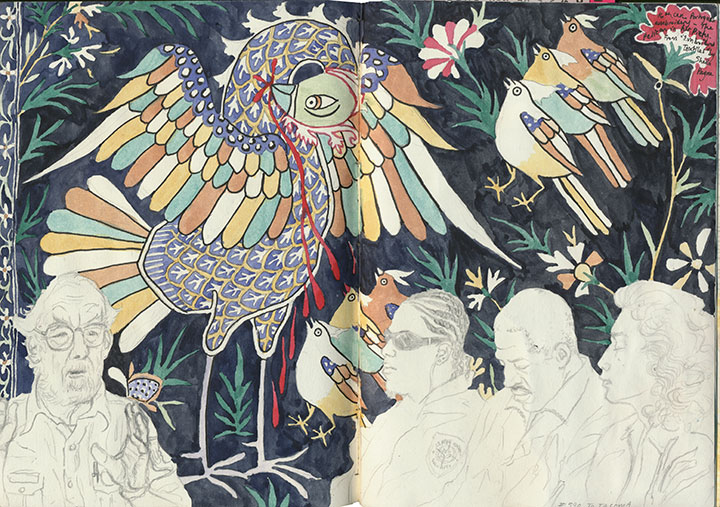
—among other things—
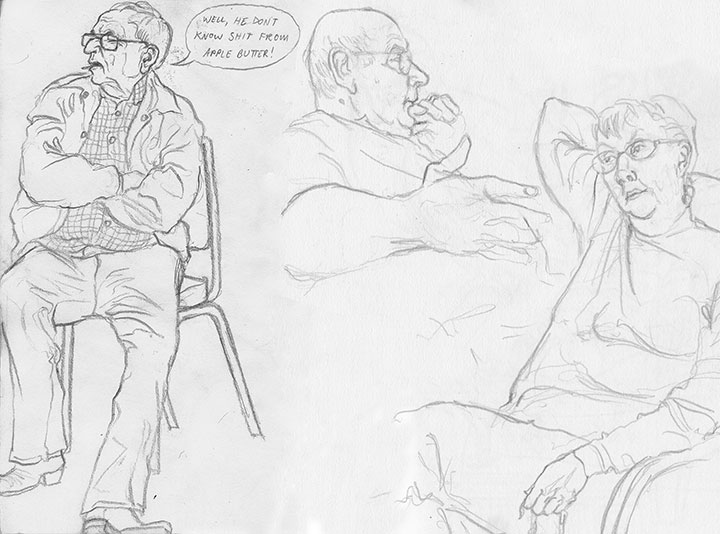
family gatherings (yes, I quoted the above verbatim; that’s the Tailor’s uncle, and he’s comedic gold);
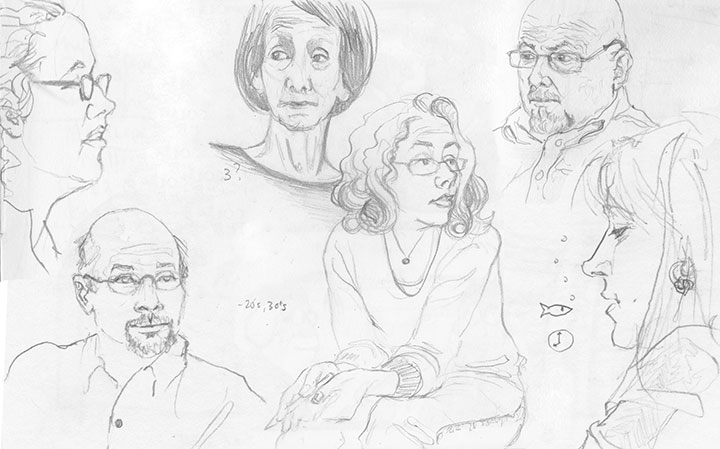
work meetings;
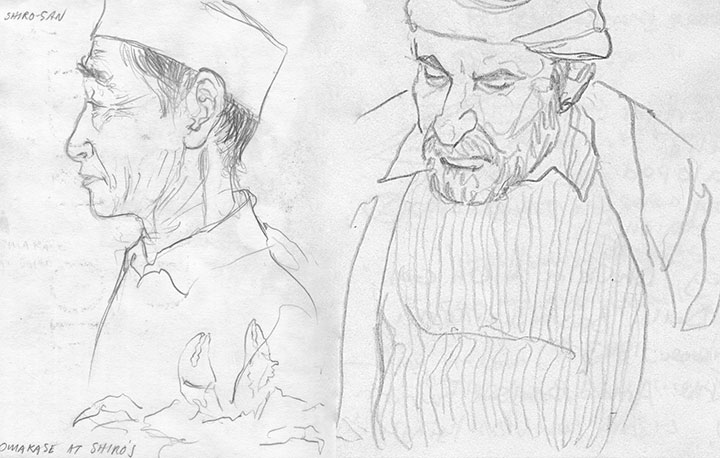
restaurants, coffee shops;
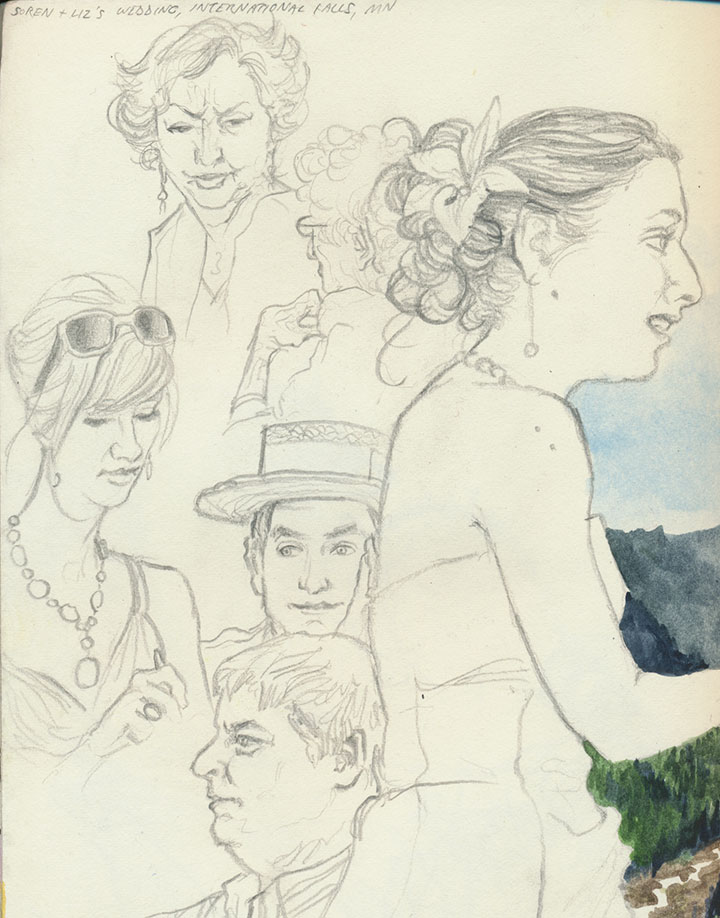
wedding receptions;
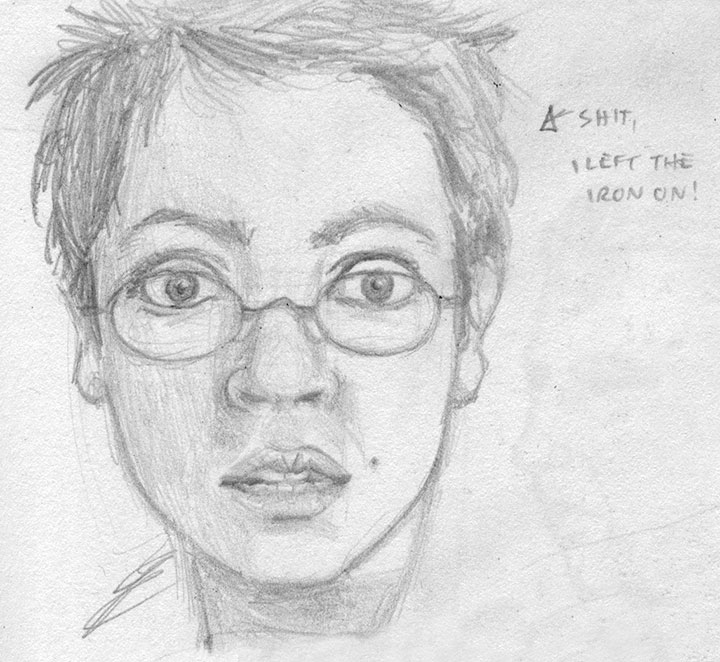
and even my own mirror, when I’m working alone (that one’s an oldie from college).
I draw when I’m trying to document an event, when I’m nervous, when I encounter a particularly unusual face, when I’m telling a story of an odd person I saw that day, when I want to preserve a loved one, and even when I’m not really aware of it—I found plenty of sketches that I had no memory of making.
Maybe there’s some psychological disorder that lists obsessive and semi-conscious sketching as a symptom, but this is one compulsion I’d like to hold on to. I know I spend more time drawing the speaker than taking actual notes, but if I remember the content just as well, I suppose it all comes out in the wash. Besides, I can’t possibly be the only one who does this, right?
Right?
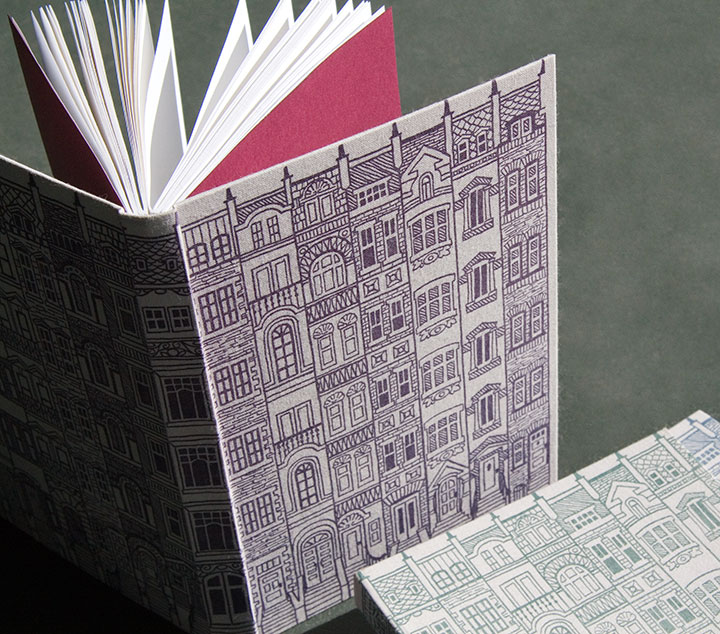
Allison of Igloo Letterpress and I have been doing some more cross-country collaboration lately. This time I illustrated a set of hand-bound journals featuring a pattern of Brownstones—one of my favorite types of houses, and a recurring theme in my drawings.
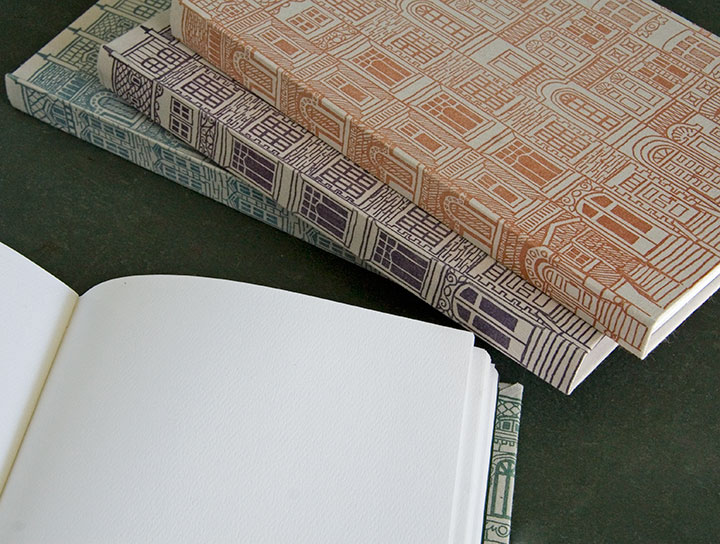
I’m so lucky to work with Allison—despite the distance, and the fact that we haven’t seen each other for two years, I feel like I we’re on the same wavelength. I love the fact that we can trust each other to make independent creative decisions, and have faith that they’ll come together into a harmonious whole. But my part of the project is finished when I send her black-and-white illustrations for printing—since I can’t exactly pop into her shop whenever I want, I really have no idea how the finished product will look until she sends it to me.
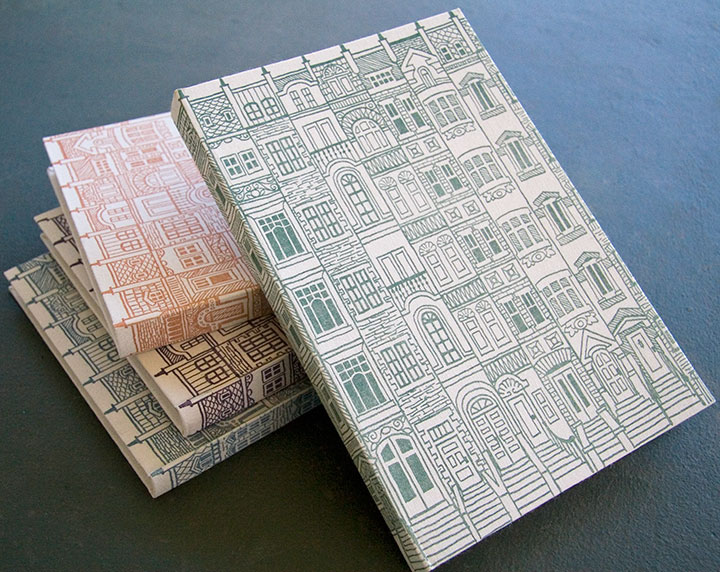
So imagine my delight when a package arrived containing four beautifully-bound hardcover books, with my illustration splashed on the cover in gorgeous color—
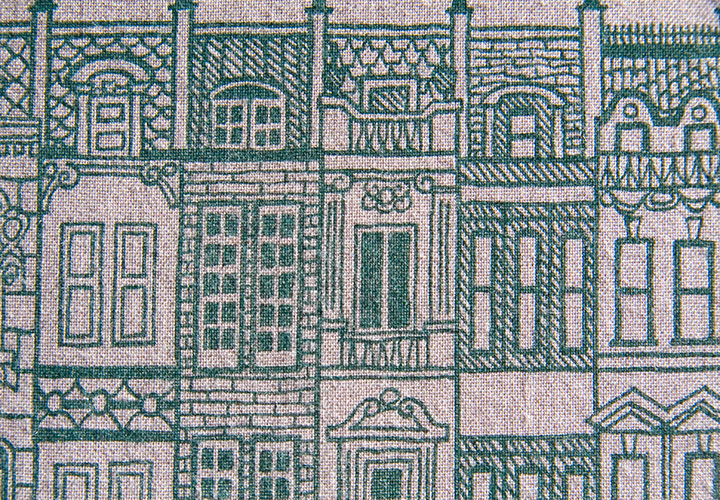
—and printed right onto the book cloth, no less!
I did a little hopping dance around the living room after that.
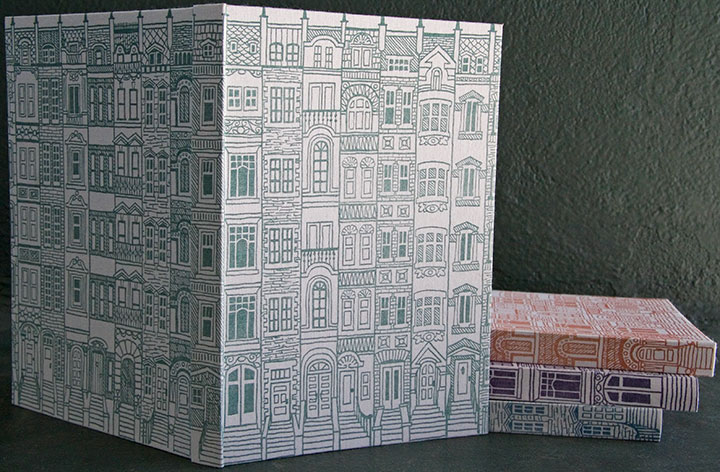
Here’s the best part, and a flash of Allison’s brilliance: not only do the books fit together thematically, but when they stand together on a bookshelf, the spines line up to complete the picture.
Since these are so labor-intensive to make, Allison is offering them only as a limited edition. But they’ve already been a big hit so far—which makes everything so, so satisfying.
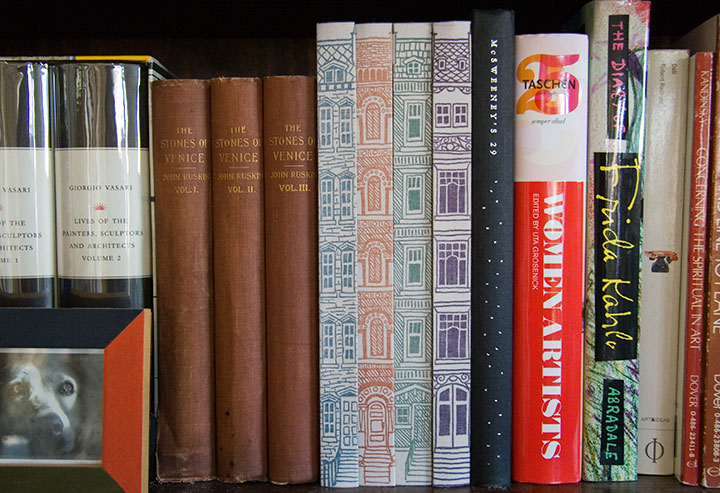
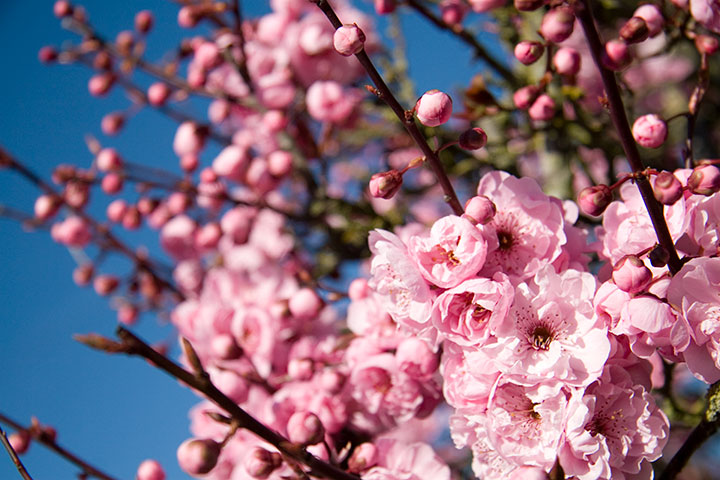
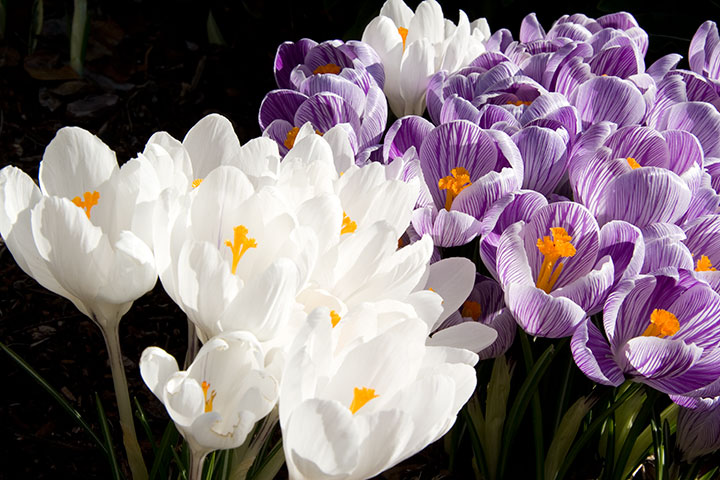
…it would be the unexpected blooming of an early spring.
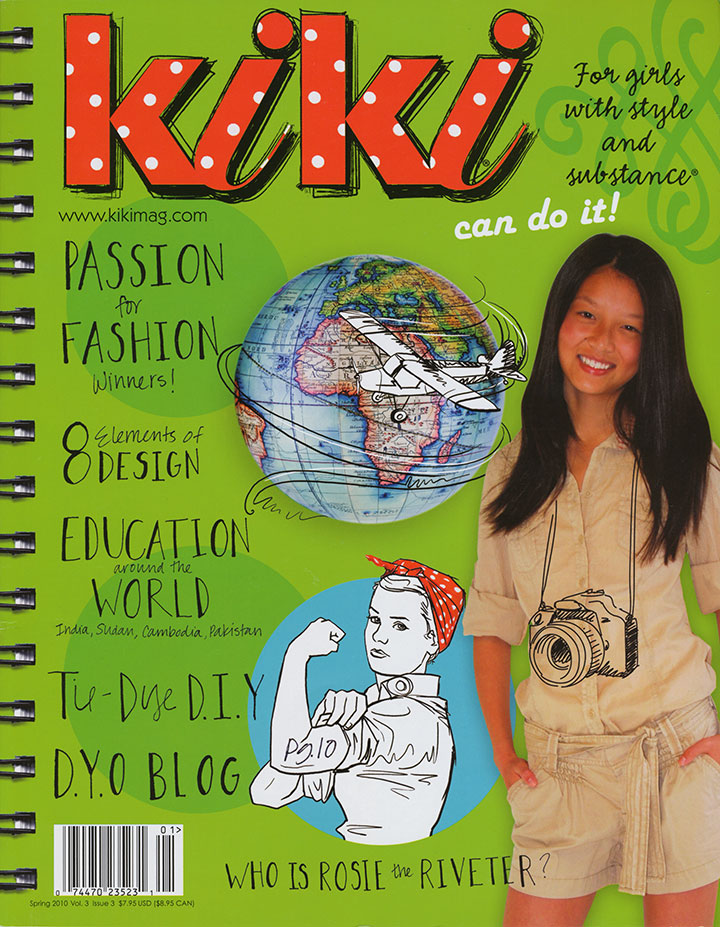
Jessica and I have had some seriously huge smiles for the past couple of days: we just received our copies of the latest issue of Kiki Magazine, which contains a feature on the Dead Feminists!
Before we were contacted for an interview, neither of us had heard of the magazine, but I can tell you that we became instant fans when we read its mission. Unlike so many other magazines written for teenage girls, which usually (even if inadvertently) tend to focus on questioning one’s body, popularity, attractiveness and overall self-worth, Kiki aims to empower girls with self-esteem, confidence, and a wide variety of knowledge and skills. As someone who is generally dismayed by the lack of respect with which our society tends to treat girls and women, and the self-loathing and doubts still being ingrained from their earliest experiences onward, Kiki seems like a breath of fresh air—and a huge relief.
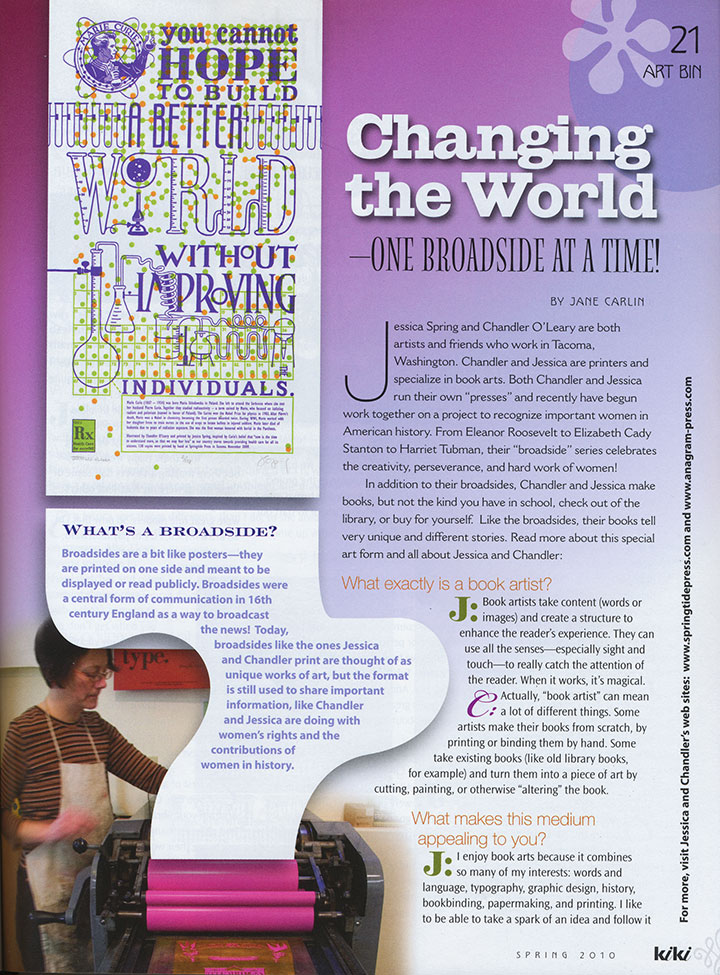
And hey—who are we really creating these broadsides for, anyway? What is it that we’re trying to change in our world? It’s not just about the social issues we cover with each piece—it’s about teaching the women and girls around us that they can be heard, that what they say and do matters.
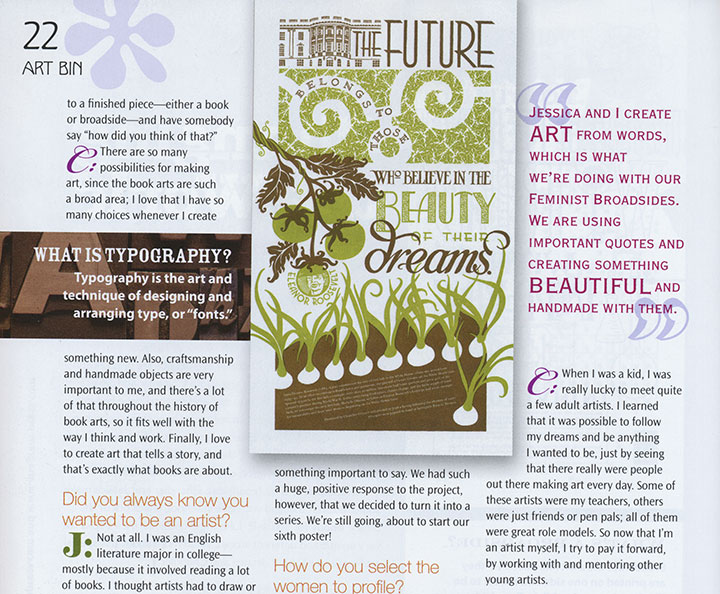
So Kiki gets an A-plus in my book, not just for the thoughtful content (no ads! No boy-crazy quizzes! All substance!), but for the fantastic design! This thing is seriously fun to read and gorgeous to look at. And look! My favorite part:
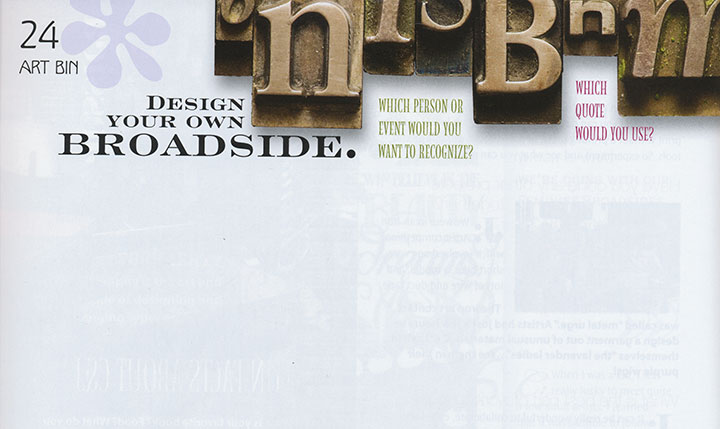
Rock on, Kiki. We’re honored to be a part of what you do.
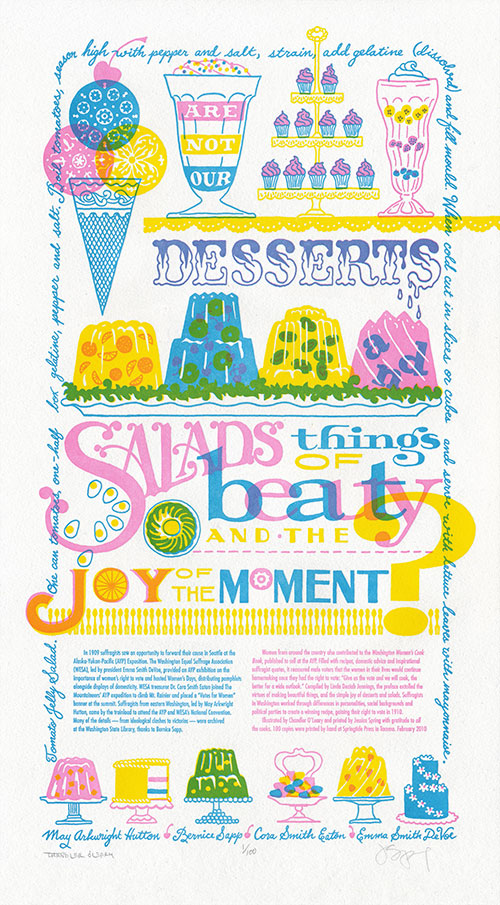

This year marks the 100th anniversary of women’s suffrage in Washington—a feat only made possible by the collaborative efforts of many dedicated people of every walk of life and political stripe. In this spirit, we present our seventh broadside in the Dead Feminists series, Just Desserts.
Through our research at the Washington State Library, we discovered that our state’s suffrage movement had many leaders, rather than one prominent figurehead. We also learned that there was so much head-butting, personality-clashing and partisan in-fighting going on within the organizations involved (Mesdames Hutton and DeVoe, I’m looking at you!) that it would be impossible to tell the whole story in one letterpress poster. So instead of quoting a single historical feminist, we cited a collaborative publication—the Washington Women’s Cook Book, published in 1908-1909 for the Alaska-Yukon-Pacific Exposition—and featured four women symbolic of the movement: May Arkwright Hutton, Bernice Sapp, Cora Smith Eaton, and Emma Smith DeVoe. The quote:
“Are not our desserts and salads things of beauty and the joy of the moment?”
The book was a clever piece of propaganda that operated on the principle that the way to a man’s heart—or vote—is through his stomach. All those jellied centerpieces and whimsical soufflés must have done the trick—the following year, women got the vote.
And for my part, the quote turned me into an almost-literal kid in a candy store; the design was just begging for elaborate confections and candy-coated typography. At first, though, I was turned off by the idea of having to draw salads (I wanted more ice cream!), until Jessica read off a litany of aspic salad and gelatin dessert recipes from the book. That’s when the light bulb turned on: Jell-o salad! The decade-plus I spent in the Midwest was about to serve me well.
Turns out that Jell-o fit right into the turn-of-the-century theme: molded gelatin desserts were a Victorian favorite, and the name “Jell-o” was first coined in 1897 (and if you look carefully, the “J” from the original Jell-o box makes a cameo in the print). There seemed to be no end of antique recipes, advertisements and illustrations at my disposal.
I might be horrified by the idea of eating gelatin salads, but drawing them was the most fun I’ve had in a long, long time. Zooey and I each spent hours researching vintage Jell-o molds—probably more for the pure fascination than for the value of the reference material.
For the sweets portion of our little menu, I turned to an old favorite for inspiration: Andy Warhol.
Forget what you know about Campbell’s soup cans or Elvis portraits; Andy got his start as an illustrator specializing in fashion and food. In 1959 he illustrated a spoof cookbook called Wild Raspberries (it’s been on my shelf since high school, and I finally found a direct use for it!), filled with ridiculous “gourmet” recipes for things like “A&P Surprise” (those of you in New England will get that one) and “Seared Roebuck.”
The illustrations are fantastic (and the polar opposite of my style), but the thing that really drew me in was the lettering. Andy had his mother, Julia Warhola, write all of the text of his early illustrations in her shaky, school-girl script. Mrs. Warhola spoke little to no English, and simply copied her son’s notes letter-for-letter, so the text in Wild Raspberries has charming errors and misspellings throughout.
I loved the down-to-earth quality of Mrs. Warhola’s cursive, so I wrote a recipe from the Washington Women’s Cook Book along the border of the broadside in a similar hand (though to warn you, it’s a recipe I wouldn’t recommend trying!).
And of course, I couldn’t do without a little ice cream homage.
Like The Curie Cure, this piece is printed in three colors—although the three we chose let us create many more. Our color scheme allowed us to print in a similar fashion to commercial printing, where a minimum of colors (CMYK—cyan, magenta, yellow, black) are layered to create a full-color image. Our layering of translucent pink, blue and yellow ink allowed us to create a full rainbow and a convincing depiction of foreign objects floating in jelly.
Heaps of thanks to everyone who came to our talk at the State Library the other night, despite lousy weather and rush-hour traffic—we had a tremendous turnout, and a huge show of support for our state’s oldest cultural institution.
One more thing: three cheers for the incredible staff at the Washington State Library (many of whom are among those whose jobs have been cut and will end very soon) who made our talk and this very piece possible. Because we couldn’t have done it without them, we have donated a portion of our proceeds to support the State Library’s collections.
After all, it’s about preserving (in jelly?) that joy of the moment for everyone to share, right?
• • • • • • • • • • • • • • • • • • • • • • • • • • • • • • • • • • • • • • • • • • • • • • • • • • • • • • • • • • • •
Just Desserts: No. 7 in the Dead Feminists series
Edition size: 100
Poster size: 10 x 18 inches
Printed on an antique Vandercook Universal One press, each piece is printed on archival, 100% rag, recycled paper, and signed by both artists.
Colophon reads:
In 1909 suffragists saw an opportunity to forward their cause in Seattle at the Alaska-Yukon-Pacific (AYP) Exposition. The Washington Equal Suffrage Association (WESA), led by president Emma Smith DeVoe, provided an AYP exhibition on the importance of women’s right to vote and hosted Women’s Days, distributing pamphlets alongside displays of domesticity. WESA treasurer Dr. Cora Smith Eaton, joined The Mountaineers’ AYP expedition to climb Mt. Rainier and placed a “Votes for Women” banner at the summit. Suffragists from eastern Washington, led by May Arkwright Hutton, came by the trainload to attend the AYP and WESA’s National Convention. Many of the details—from ideological clashes to victories—were archived at the Washington State Library, thanks to Bernice Sapp.
Women from around the country also contributed to the Washington Women’s Cook Book, published to sell at the AYP. Filled with recipes, domestic advice and inspirational suffragist quotes, it reassured male voters that the women in their lives would continue homemaking once they had the right to vote: “Give us the vote and we will cook, the better for a wide outlook.” Compiled by Linda Deziah Jennings, the preface extolled the virtues of making beautiful things, and the simple joy of desserts and salads. Suffragists in Washington worked through differences in personalities, social backgrounds and political parties to create a winning recipe, gaining their right to vote in 1910.
UPDATE: poster is sold out. Reproduction postcards available in the Dead Feminists shop!
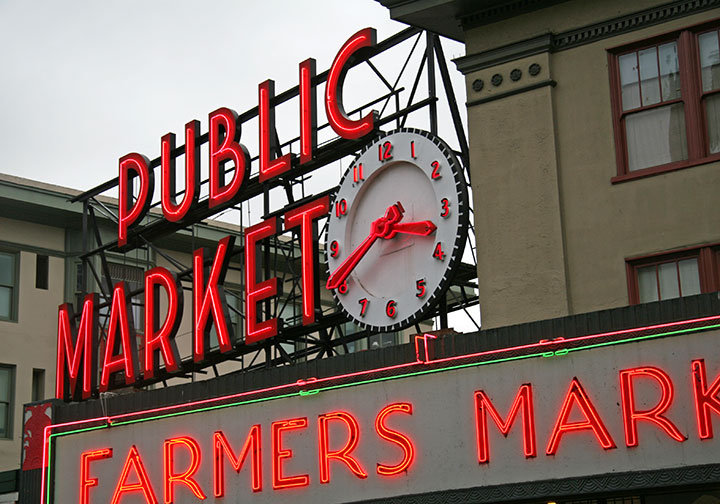
The past couple of weeks have been an absolute whirlwind, and when I look in the mirror I see a walking, talking to-do list. The notes-to-self strewn all over the studio (among half-finished boxes, reference materials, pencil layouts, proof prints, watercolor pans, etc.) aren’t enough, so now I’ve taken to muttering little reminders under my breath—call this client, mail this order, drop off this pile of prints, invoice this subscriber, edit this illustration, proof these plates, cut this book cloth, list these cards, upload these photos, etc.
I needed a break. So today I bolted to Seattle to clear my head.
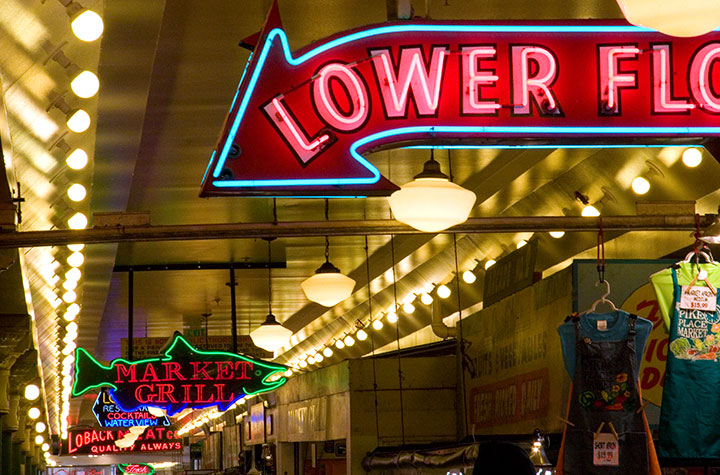
One of my favorite hobbies is wandering around the Market alone, especially on winter weekdays when it’s pretty much empty. Losing myself among the fruit stalls and neon is as therapeutic as meditation.
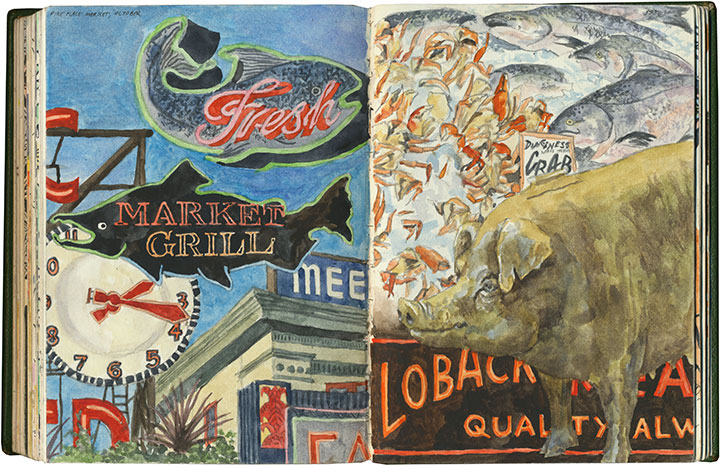
I wasn’t in the drawing mood this time, but the Market is also on my short list of all-time favorite sketching haunts. This is one from a year ago or so, on a completely packed, sunny Saturday, when I flattened myself against poles and ducked down onto the curb to draw without being trampled by tourists.
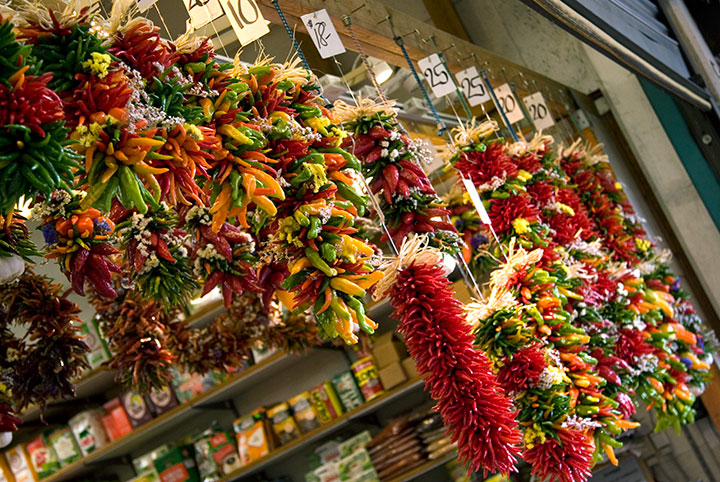
I love it for the people-watching when it’s crowded, but there’s something special about having the place to myself. There is a downside, however (besides being heckled by bored fishmongers): it’s awfully hard not to splurge on sampling from the unbelievable smorgasbord of fresh goodies.
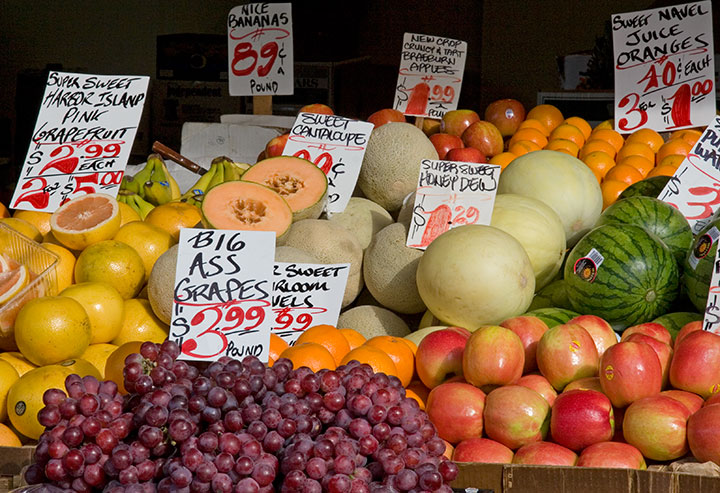
Now how could I say no to that?
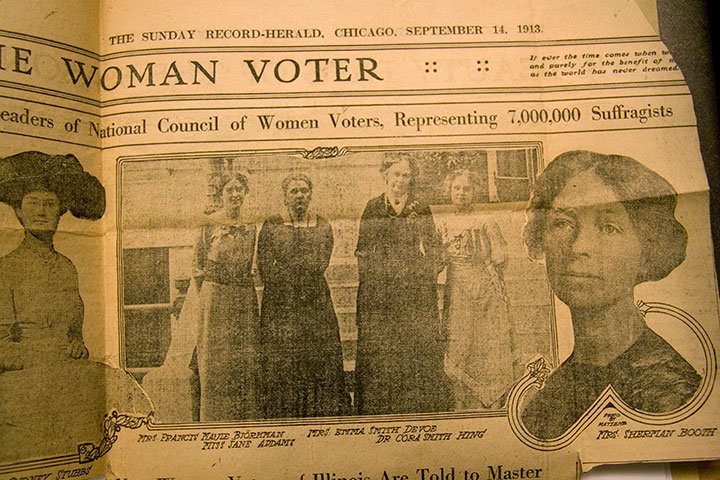
It’s just about that time again: Jessica and I are working hard on the next Dead Feminist broadside. She’s poring through texts and historical facts, and I’m pencilling as fast as my tendonitis will let me. This time we’ll be unveiling the new piece at the Washington State Library near Olympia; the staff invited us to give a lecture about the series next month.
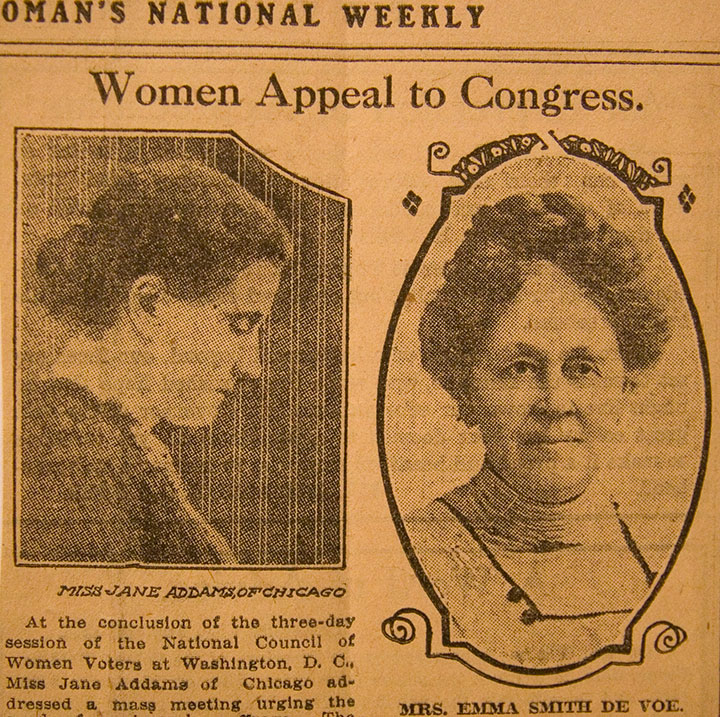
The library boasts the entire collection of letters and personal papers of Emma Smith DeVoe (pictured above, right), women’s rights activist and leader of the Washington suffragist movement. And since this year marks the 100th anniversary of women’s suffrage in Washington, we figured Emma would be a perfect fit for the new piece.
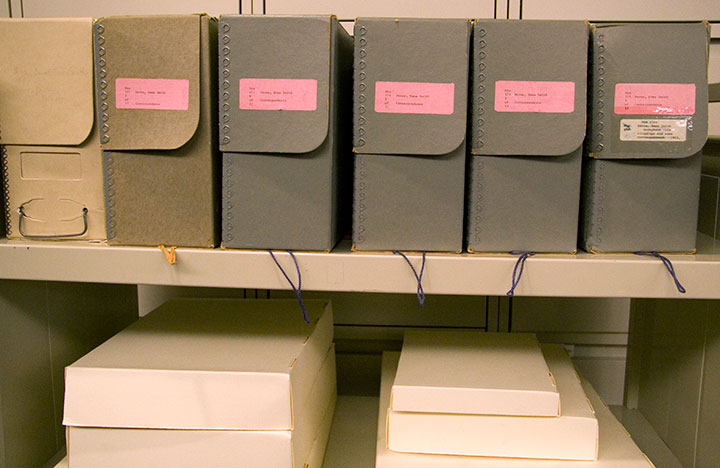
So a couple of weeks ago, Jessica, Zooey (R.I.P., J.D. Salinger) and I took a field trip to visit the archives and conduct a little research. When we arrived, we realized what they meant by “collection:” twelve enormous boxes packed full of letters, clippings and souvenirs. A “little” research obviously wasn’t going to happen.
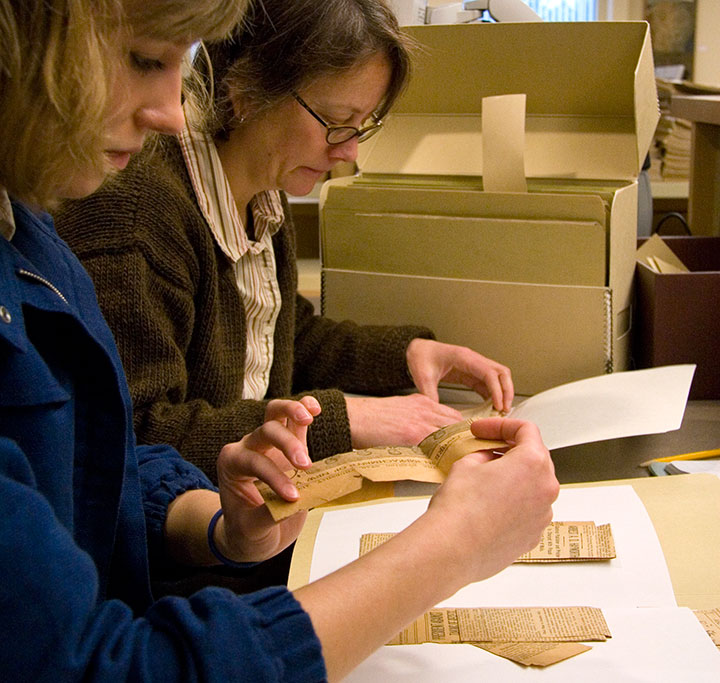
Luckily, the incredibly knowledgeable and helpful library staff (thank you, Sean!) let us take as much time and as many photos as we needed. So we cozied up to a work station and dived in, one box at a time. Together we went through literally thousands of pieces of paper.
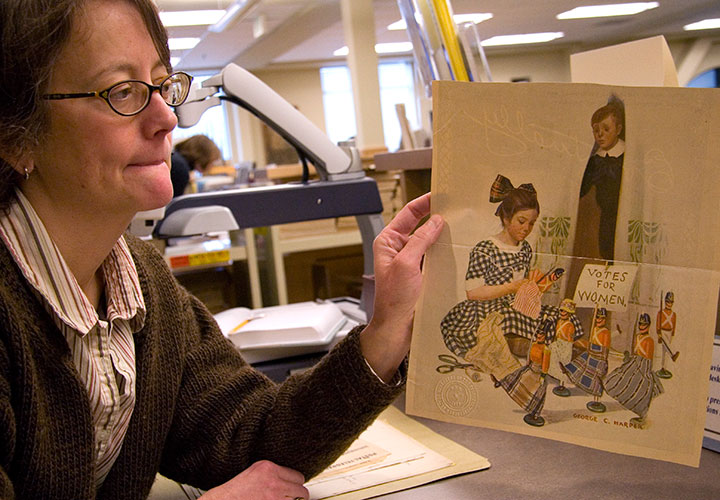
What we found was a fascinating collection of souvenirs, business cards, newspaper clippings,
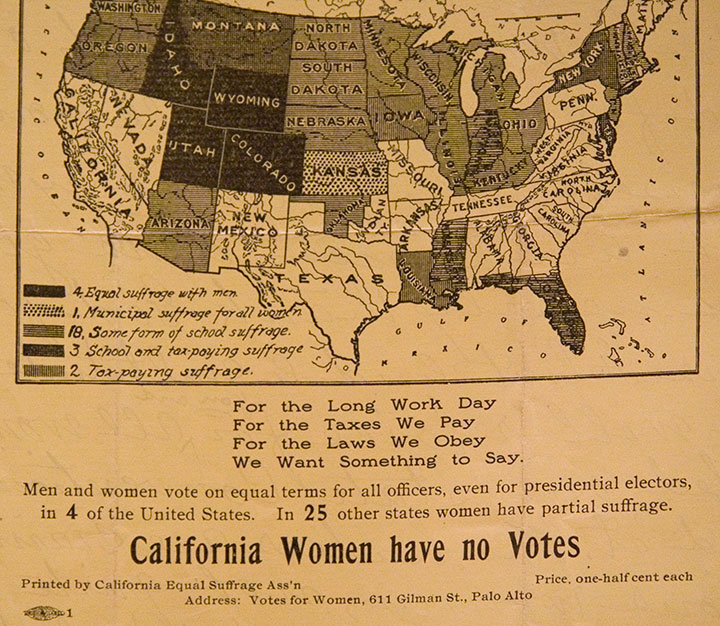
leaflets and other propaganda,
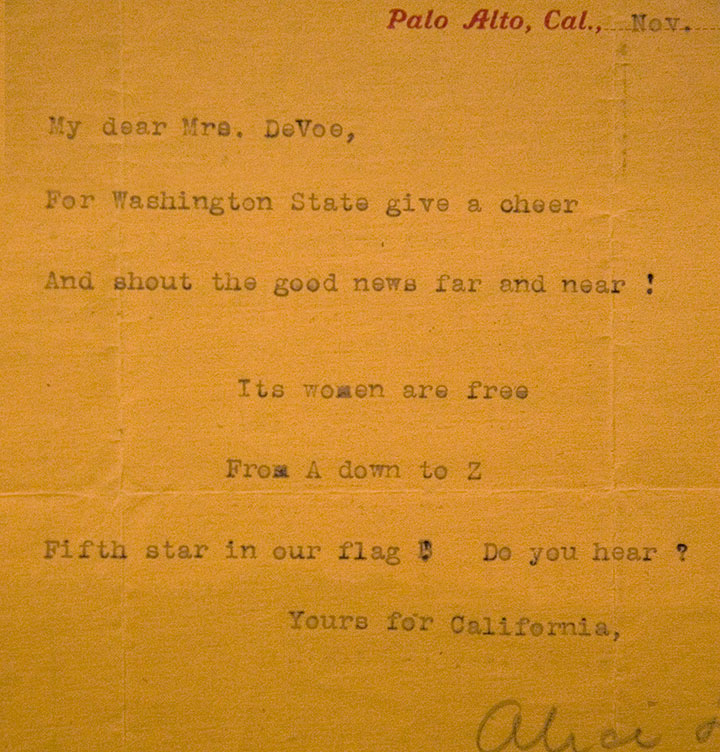
fan letters (Emma had an impressive array of admirers),
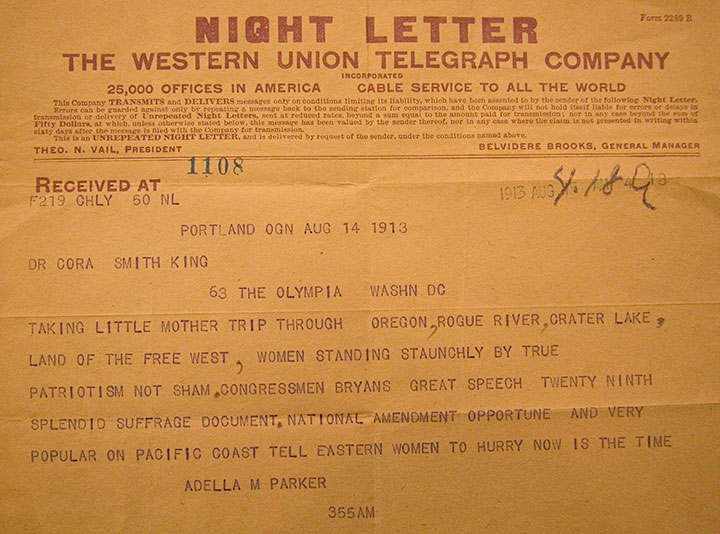
telegrams, notes from sitting U.S. senators and presidential aides, and reams and reams of correspondance between the members of the Washington suffragist movement.
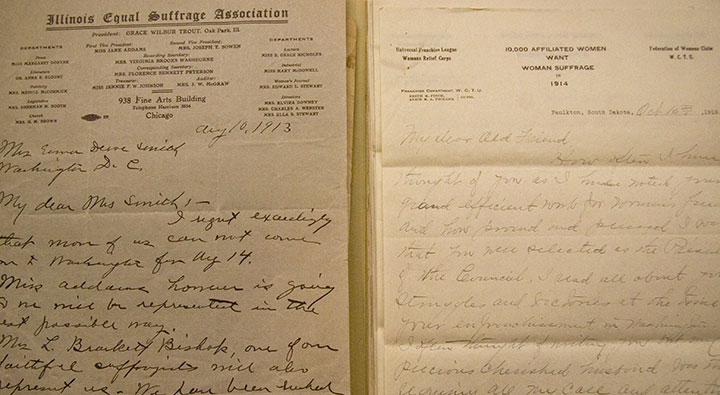
The trouble was, most of these documents were utterly mundane—letter after letter simply acknowledged receipt of previous correspondance, or gave detailed instructions for planning events and delegating tasks. Worst of all, Emma rarely made carbon copies of her half of the correspondance, so there was very little in her own voice.
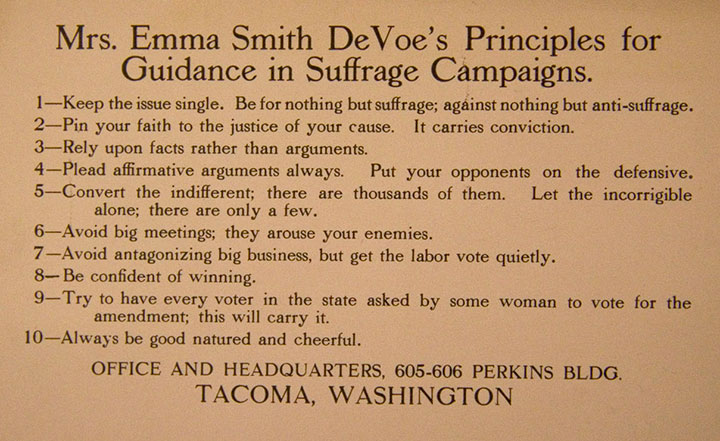
We spent nearly four hours poring over every folder and box, and the only potential Emma quotes we found were mined from this instructional card. Still, it didn’t feel like we had found our inspiration—just a few weeks from our talk, we had no quote and no social topic for the piece.
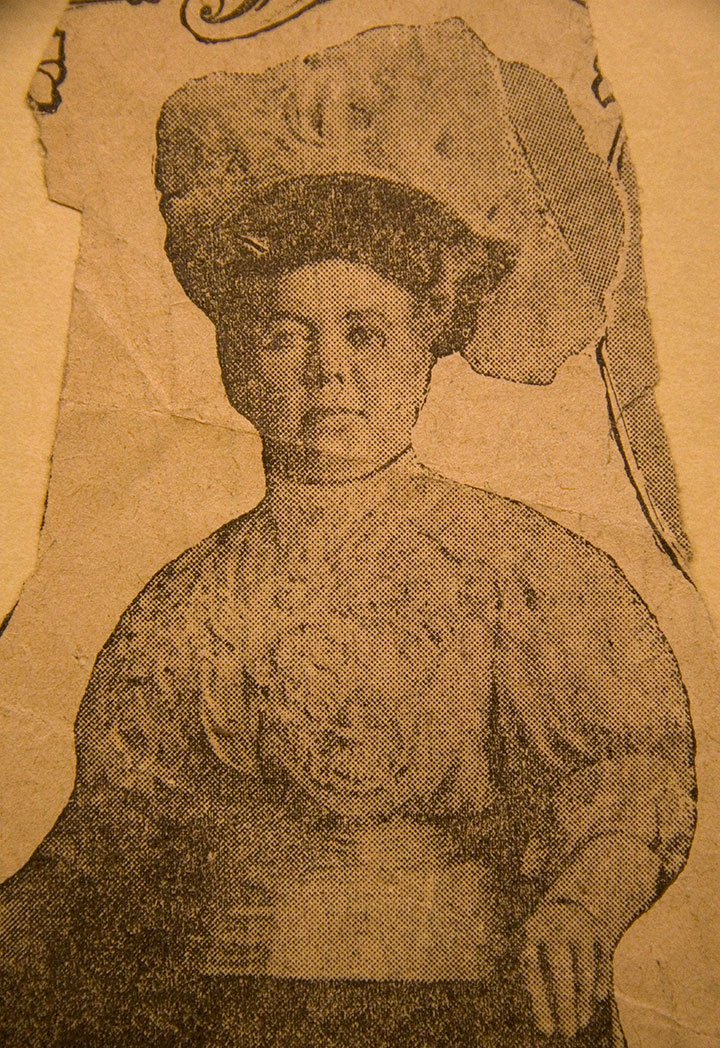
What we did have, however, was a much clearer picture of the women behind the fight for suffrage in our state (that’s May Arkwright Hutton above; she and Emma didn’t exactly get along), right down to addresses of homes and buildings still standing in Tacoma (the headquarters of the movement).
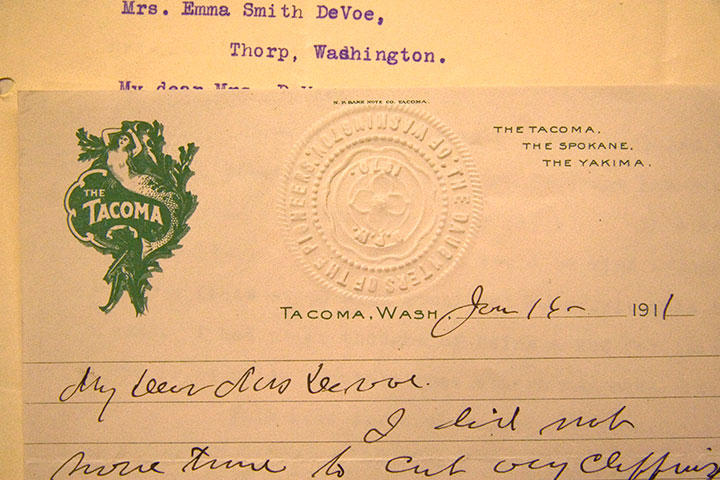
From the documents themselves to the individual script hands of each letter writer, we had an incredible window into political life from a hundred years ago.
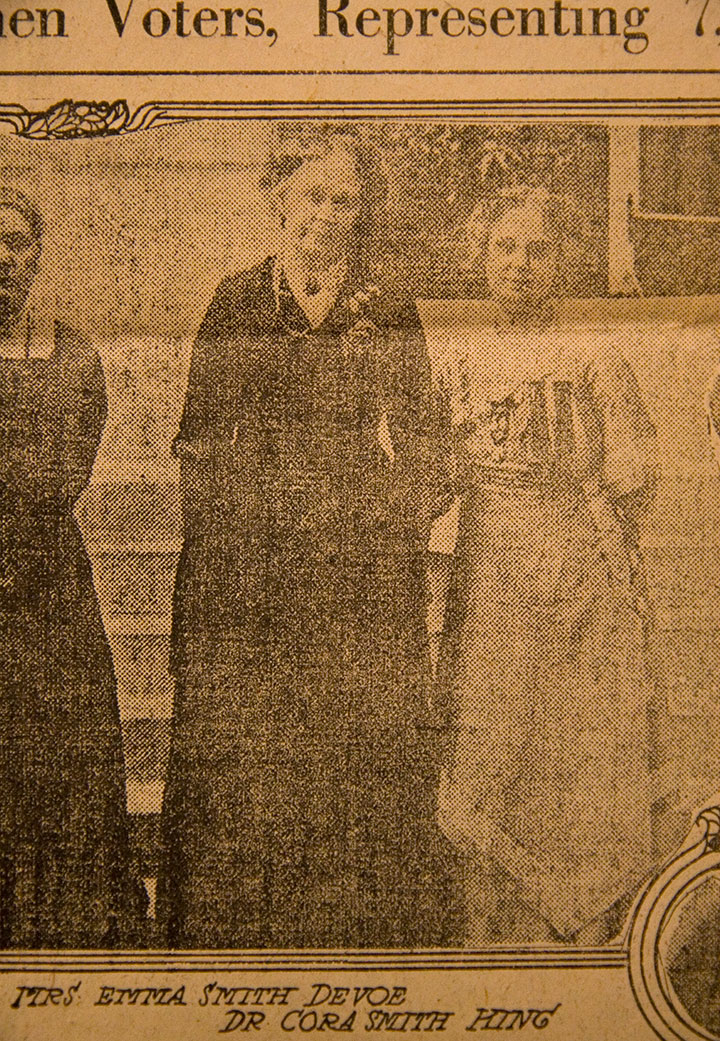
And we found a good lead. Just as interesting as Emma (and more forthcoming with their own voices) were Cora Smith Eaton King, M.D. (pictured above, right)—correspondent, fellow leader of the movement, and one of the first women to scale Mt. Rainier!—and Bernice Sapp—friend, activist, and the one who compiled this collection of documents and donated it to the library.
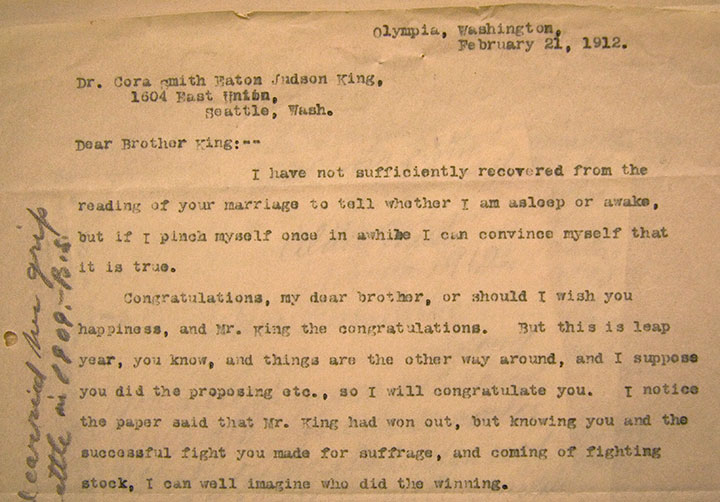
Bernice’s letters were full of quirky character and wit. We loved how she called Emma “the General,” and referred to herself and other suffragists by male titles: “Brother King,” “Mr. Hutton,” or simply “him.”
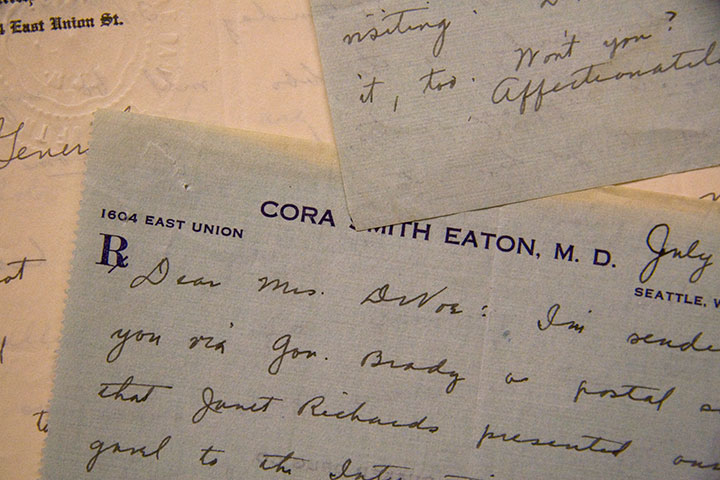
Cora, on the other hand, was a real firecracker. Her letters (often scribbled on scraps of paper, even her own prescription pad!) revealed an eloquent intelligence and a sizzling sense of humor. We fell head-over-heels for Cora, and began to doubt that Emma was the right voice for the broadside—still, though, we had no quote from any of these women.
A few days later, Jessica hit up the astounding Northwest Room at the Tacoma Public Library, and hit the jackpot. She discovered a document that linked all of these women together, which decided us on a slightly different approach to quoting historical feminists. That’s all I’ll say for now, except that the new broadside may or may not depict a certain quivering, questionable “food” substance:
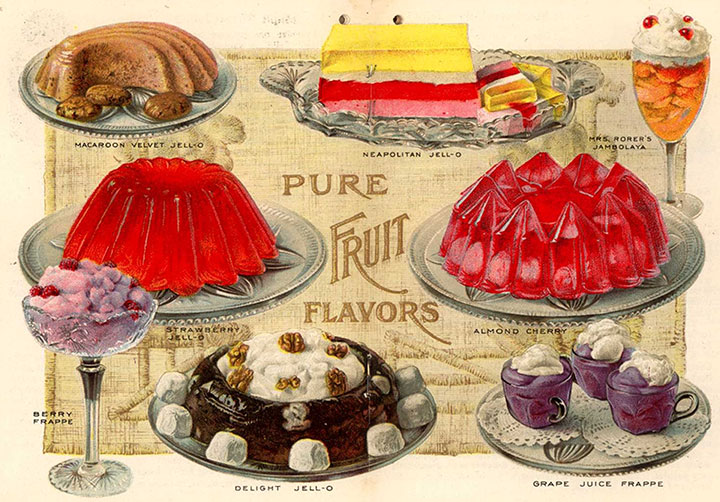
If you want to be one of the first to see what the heck I’m talking about, I invite you to come check out our talk at the Washington State Library. Here are the details:
Pressing Matters: an evening with Chandler O’Leary and Jessica Spring
Wednesday, February 10, 2010
6:30 p.m. (doors open at 6:00), free!
Washington State Library
6880 Capitol Boulevard, Tumwater, WA
Libraries and archives face a tough reality in the current economy—especially here in Washington, where a regressive tax system has left the State Library with a 30% staff reduction and major cuts to its operating and acquisitions budgets. The 2003 earthquake damaged their building on the historic capital campus in Olympia, and forced them to relocate “temporarily” to a suburban office park a few miles south in Tumwater. Even when the economy recovers, it is unlikely the library’s funding will return to the levels it enjoyed in more prosperous eras, so the move to Tumwater is looking increasingly permanent. Despite these setbacks, the State Library continues to acquire new items (including our artwork!) for the collection and provide an essential service in preserving our state’s history. So please come and show your support for the library—a good turnout will help them provide more public events in the future, and might just go a long way toward saving them from another visit to the chopping block.
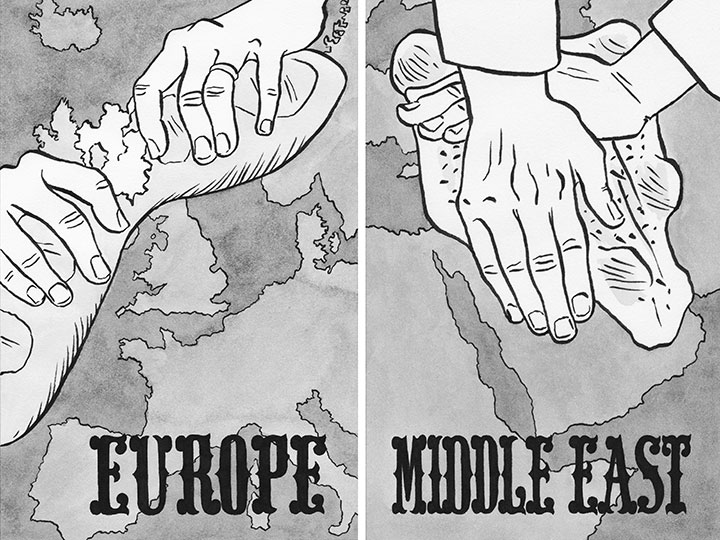
I’m currently working on the illustrations for a cookbook being published this year, so I’m drawing a whole lot of hands lately. Hands carrying dishes, maneuvering chopsticks, folding samosas, kneading dough, etc.
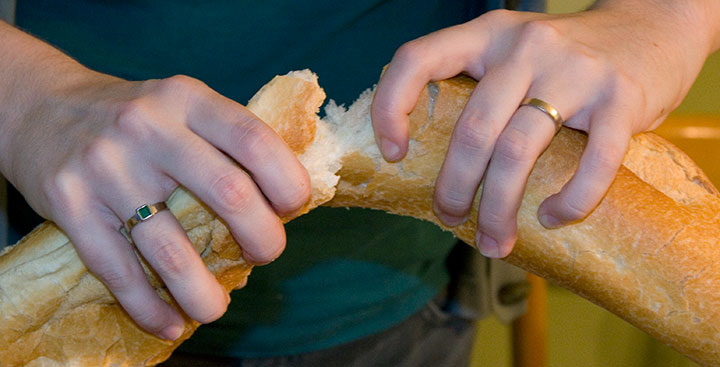
Since I usually work by myself, I often have to be my own model. For the most part, this works out fine, but hands are a tricky business—especially when you need to draw both hands at once, and you need one to operate a pencil.
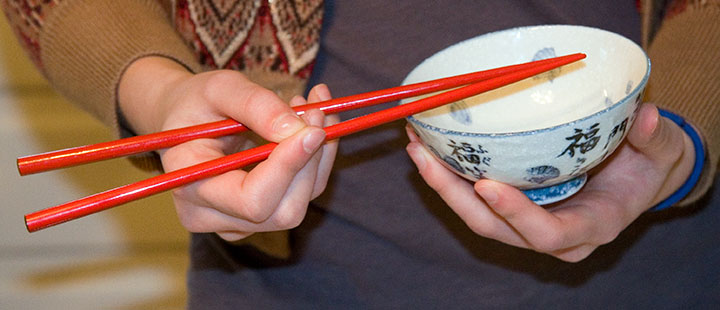
Enter the lovely Zooey—who could both photograph my hands for me and be hand model herself. We took turns ripping a baguette to shreds for the camera (to mix up the hand anatomy), and mimed with nearly every dish in the house, just in case.
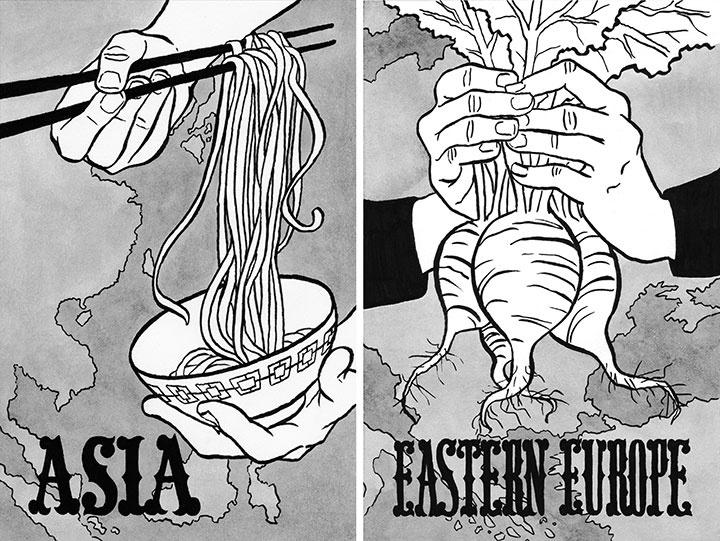
I can’t tell you how helpful it’s been to have her here while I’ve been doing these illustrations. Whenever something wasn’t quite right, I could say, “Hey, Zooey, can you pick up those chopsticks again? I need to sketch a different angle.” And Bob’s your uncle, I’d get what I needed.
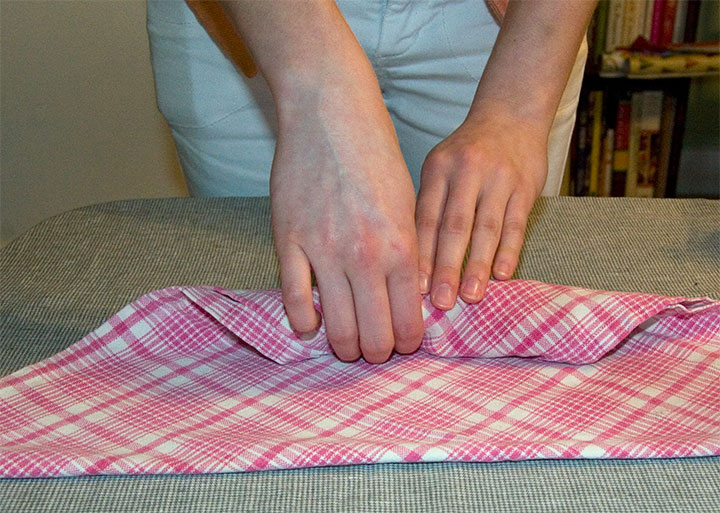
This week we spent a couple of afternoons shooting reference photos. Zooey rolled and unrolled pretend spring rolls made of fabric and made “samosas” with a scrap of denim.
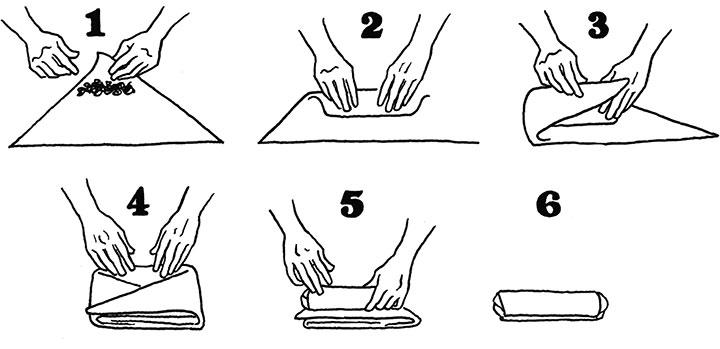
It was probably tedious for her, but the end result was a bunch of instructional illustrations that actually made sense!
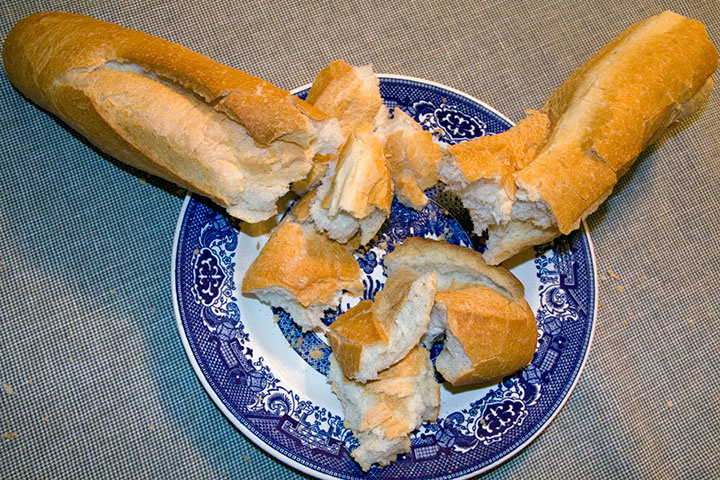
And we made a mess of the bread (doesn’t make it taste any less good!), but Zooey can say she has some pretty, uh, unique on-the-job training under her belt.
• • • • • • • • • • • • • • • • • • • • • • • • • • • • • • • • • • • • • • • • • • • • • • • • • • • • • • • • • • • •
In other news, I did a little website tweaking over the weekend, and added an F.A.Q. (it makes me giggle to pronounce it “Fack.”) If you ever wondered what I mean about half the things I say around here (and judging by the volume of questions I get on a nearly daily basis, you might), go and check it out here—it’s a whopper.
It ended up being a lot of fun to write, because I got to play the part of the snarky interrogator (not that I get many of those, but it’s fun to write like one). I did practice some restraint, however; I was tempted to include a question I get more often than I’d like to admit: “Wait, aren’t you a guy?” True story. Sigh.
Also in the running was “Will you print 1000 coffee mugs with ‘World’s Number One Dad’ for me?” Because I really did get that email once, along with quite a few others mistaking my business for something entirely different. Maybe this will clear things up just a bit…